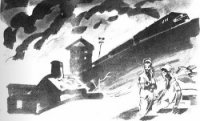Watership Down - Adams Richard George (читать книги бесплатно полностью без регистрации TXT) 📗
Without Campion, probably not one rabbit would have got back to Efrafa. As it was, all his skill as a patroller could not bring home half of those who had come to Watership. Three or four had run and strayed too far to be found and what became of them no one ever knew. There were probably fourteen or fifteen rabbits-no more-who set off with Campion, some time before ni-Frith, to try to retrace the long journey they had made only the previous day. They were not fit to cover the distance by nightfall: and before long they had worse to face than their own fatigue and low spirits. Bad news travels fast. Down to the Belt and beyond, the rumor spread that the terrible General Woundwort and his Owsla had been cut to pieces on Watership Down and that what was left of them was trailing southward in poor shape, with little heart to keep alert. The Thousand began to close in-stoats, a fox, even a tomcat from some farm or other. At every halt yet another rabbit was not to be found and no one could remember seeing what had happened to him. One of these was Vervain. It had been plain from the start that he had nothing left and, indeed, there was little reason for him to return to Efrafa without the General.
Through all the fear and hardship Campion remained steady and vigilant, holding the survivors together, thinking ahead and encouraging the exhausted to keep going. During the afternoon of the following day, while the Off Fore Mark were at silflay, he came limping through the sentry line with a straggling handful of six or seven rabbits. He was close to collapse himself and scarcely able to give the Council any account of the disaster.
Only Groundsel, Thistle and three others had the presence of mind to dart down the opened run when the dog came. Back in the Honeycomb, Groundsel immediately surrendered himself and his fugitives to Fiver, who was still bemused from his long trance, and scarcely restored to his senses sufficiently to grasp what was toward. At length, however, after the five Efrafans had remained crouching for some time in the burrow, listening to the sounds of the dog hunting above, Fiver recovered himself, made his way to the mouth of the run where Bigwig still lay half conscious, and succeeded in making Holly and Silver understand that the siege was ended. There was no lack of helpers to tear open the blocked gaps in the south wall. It so happened that Bluebell was the first through into the Honeycomb; and for many days afterward he was still improving upon his imitation of Captain Fiver at the head of his crowd of Efrafan prisoners-"like a tomtit rounding up a bunch of molting jackdaws," as he put it.
No one was inclined to pay them much attention at the time, however, for the only thoughts throughout the warren were for Hazel and Bigwig. Bigwig seemed likely to die. Bleeding in half a dozen places, he lay with closed eyes in the run he had defended and made no reply when Hyzenthlay told him that the Efrafans were defeated and the warren was saved. After a time, they dug carefully to broaden the run and as the day wore on the does, each in turn, remained beside him, licking his wounds and listening to his low, unsteady breathing.
Before this, Blackberry and Dandelion had burrowed their way in from Kehaar's run-it had not been blocked very heavily-and told their story. They could not say what might have happened to Hazel after the dog broke loose, and by the early afternoon everyone feared the worst. At last Pipkin, in great anxiety and distress, insisted on setting out for Nuthanger. Fiver at once said that he would go with him and together they left the wood and set off northward over the down. They had gone only a short distance when Fiver, sitting up on an anthill to look about, saw a rabbit approaching over the high ground to the west. They both ran nearer and recognized Hazel. Fiver went to meet him while Pipkin raced back to the Honeycomb with the news.
As soon as he had learned all that had happened-including what Groundsel had to tell-Hazel asked Holly to take two or three rabbits and find out for certain whether the Efrafans had really gone. Then he himself went into the run where Bigwig was lying. Hyzenthlay looked up as he came.
"He was awake a little while ago, Hazel-rah," she said. "He asked where you were; and then he said his ear hurt very much."
Hazel nuzzled the matted fur cap. The blood had turned hard and set into pointed spikes that pricked his nose.
"You've done it, Bigwig," he said. "They've all run away."
For several moments Bigwig did not move. Then he opened his eyes and raised his head, pouching out his cheeks and sniffing at the two rabbits beside him. He said nothing and Hazel wondered whether he had understood. At last he whispered, "Ees finish Meester Voundvort, ya?"
"Ya," replied Hazel. "I've come to help you to silflay. It'll do you good and we can clean you up a lot better outside. Come on: it's a lovely afternoon, all sun and leaves."
Bigwig got up and tottered forward into the devastated Honeycomb. There he sank down, rested, got up again and reached the foot of Kehaar's run.
"I thought he'd killed me," he said. "No more fighting for me-I've had enough. And you-your plan worked, Hazel-rah, did it? Well done. Tell me what it was. And how did you get back from the farm?"
"A man brought me in a hrududu," said Hazel, "nearly all the way."
"And you flew the rest, I suppose," said Bigwig, "burning a white stick in your mouth? Come on, tell me sensibly. What's the matter, Hyzenthlay?"
"Oh!" said Hyzenthlay, staring. "Oh!"
"What is it?"
"He did!"
"Did what?"
"He did ride home in a hrududu. And I saw him as he came-that night in Efrafa, when I was with you in your burrow. Do you remember?"
"I remember," said Bigwig. "I remember what I said, too. I said you'd better tell it to Fiver. That's a good idea-let's go and do it. And if he'll believe you, Hazel-rah, then I will."
50. And Last
Professing myself, moreover, convinced that the General's unjust interference, so far from being really injurious to their felicity, was perhaps rather conducive to it, by improving their knowledge of each other, and adding strength to their attachment, I leave it to be settled by whomsoever it may concern…
It was a fine, clear evening in mid-October, about six weeks later. Although leaves remained on the beeches and the sunshine was warm, there was a sense of growing emptiness over the wide space of the down. The flowers were sparser. Here and there a yellow tormentil showed in the grass, a late harebell or a few shreds of purple bloom on a brown, crisping tuft of self-heal. But most of the plants still to be seen were in seed. Along the edge of the wood a sheet of wild clematis showed like a patch of smoke, all its sweet-smelling flowers turned to old man's beard. The songs of the insects were fewer and intermittent. Great stretches of the long grass, once the teeming jungle of summer, were almost deserted, with only a hurrying beetle or a torpid spider left out of all the myriads of August. The gnats still danced in the bright air, but the swifts that had swooped for them were gone and instead of their screaming cries in the sky, the twittering of a robin sounded from the top of a spindle tree. The fields below the hill were all cleared. One had already been plowed and the polished edges of the furrows caught the light with a dull glint, conspicuous from the ridge above. The sky, too, was void, with a thin clarity like that of water. In July the still blue, thick as cream, had seemed close above the green trees, but now the blue was high and rare, the sun slipped sooner to the west and, once there, foretold a touch of frost, sinking slow and big and drowsy, crimson as the rose hips that covered the briar. As the wind freshened from the south, the red and yellow beech leaves rasped together with a brittle sound, harsher than the fluid rustle of earlier days. It was a time of quiet departures, of the sifting away of all that was not staunch against winter.




